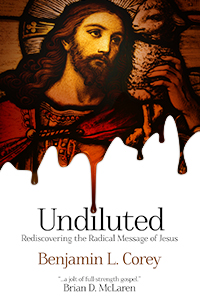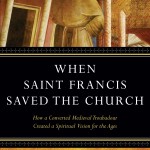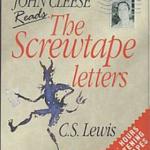 Fundamentalism is associated with right-wing movements that say the true path is one of harshness, judgement and tribalism. But there have always been waves of reform in religions calling for a return to other types of fundamentals; they sometimes (rarely) say that the old ways to which we should return are more gentle, open and loving. For the last few generations, conservative fundamentalists have defined Christianity in the public sphere. But this has been crumbling in recent years as their children and grandchildren find their own path. Many are struck by the disconnect between the teachings of Jesus upon which they’re told their religion is based, and the politics and behavior of the Christianity in which they’re raised. The core teachings of Jesus are so focused on love, mercy and non-aggression that it takes a deliberate ignoring of those teachings to maintain a Christianity which is angry, unmerciful and materialistic.
Fundamentalism is associated with right-wing movements that say the true path is one of harshness, judgement and tribalism. But there have always been waves of reform in religions calling for a return to other types of fundamentals; they sometimes (rarely) say that the old ways to which we should return are more gentle, open and loving. For the last few generations, conservative fundamentalists have defined Christianity in the public sphere. But this has been crumbling in recent years as their children and grandchildren find their own path. Many are struck by the disconnect between the teachings of Jesus upon which they’re told their religion is based, and the politics and behavior of the Christianity in which they’re raised. The core teachings of Jesus are so focused on love, mercy and non-aggression that it takes a deliberate ignoring of those teachings to maintain a Christianity which is angry, unmerciful and materialistic.
Fundamentalist reformers by definition believe they are bringing the faith back to its roots; this usually goes hand-in-hand with extreme judgment of the current state of the faith, which they see as watered down, tainted by outside influences. Benjamin Corey begins Undiluted: Rediscovering the Radical Message of Jesus by talking about how fundamentalists have used the term “watering down the message” as a criticism of liberal Christianity, suggesting that the purer version of Christianity is theirs, which is rooted in Old Testament law. Corey says, no, the undiluted Christianity is one grounded in the words and person of Jesus. In this way, Corey is no different from other fundamentalists; it’s just that the fundamentals he seeks to return to are based on the teachings of Jesus rather than the book of Leviticus. Undiluted
is more a personal testimonial than a theological treatise. It follows Corey as he encounters the authentic Jesus and struggles to follow Him, learning that this means changing his worldview from the black-and-white one his fundamentalist upbringing gave him.
A favorite observation of mine by Richard Rohr about the Christian contemplative path could be applied equally well to reorienting one’s life to follow the teachings of Jesus (because those amount to the same thing): It will ruin you for cocktail party conversation. Your views will no longer fit into neat predefined partisan little boxes, and you’ll be unwilling to share in the demonizing of those with whom you disagree; you might even argue for a better understanding of what might be right in their views. It also changes your priorities. You will care a lot less about what you have and what others think of you, and a lot more about your relationships with other people and whether they are grounded in love (leading to the revelation that many of your current relationships are not grounded in love.)
In some ways Undiluted‘s strongest message is also its limitation. Echoing the Jesus movement which was one part of the roots of modern evangelicalism, Corey says again and again: it’s all about Jesus. I bristle whenever I hear this litmus test. After many years as a Quaker, shunning ritual, tradition and church authority, more recently I’ve come to find tremendous Truth and spiritual beauty in them. Yes, it should all be consistent with Jesus, but I don’t think it all has to be about Jesus. For example, the Jesus test comes up with my Christian meditation practice. Every once in a while, I’ll meet someone who says that if Jesus is not central in the practice then it is dangerous — open to the demonic or something. No. It’s just a spiritual practice that’s not all about Jesus. The fact that Jesus isn’t central doesn’t mean the Devil is. It just means it’s about something else. (In this case, about developing a less self-focused, thought-driven posture towards life, which will indirectly leave far more room for Jesus, and seeing every person as your neighbor.)
So in some ways, Corey has set up a new Them, perpetuating the us/them dichotomy. The new Them is the conservative Christian leaders. He equates them to the Pharisees of Jesus’ time, and suggests these tradition- and law-oriented bureaucrats are the opposition. But the Pharisees weren’t Jesus’ enemies. As Amy-Jill Levine has pointed out, the Pharisees were simply religious leaders of that time; Jesus debated with them, some helped him, some followed him, some opposed him; one was Paul. Most were not hypocrites then, nor are most church leaders hypocrites today.
Obviously there’s immeasurable importance in returning regularly to the words of Jesus. For Corey’s own journey, this seems to be what was necessary to break free of the fundamentalism in which he was raised. Undiluted offers those from a fundamentalist tradition a way out of the political quagmire their movement has descended into. It is a reminder that the center of Christianity is Jesus Christ; that if an article of dogma or political posture is in contradiction to the teachings of Jesus, then it cannot and should not be a part of their faith. While I agree with much of what Corey says, I prefer a posture that is less combative and negative; one that simply speaks to the way Christianity could be. But I’m not a former fundamentalist. I was not raised in that culture and so I am not reacting against it. This book is an impassioned and provocative book, and will be most valuable to ex-fundamentalists who are on a path similar to Corey’s. And also, as Kurt Willems observes, for them to hand to their fundamentalist friends who are worried about them.
Undiluted: Rediscovering the Radical Message of Jesus is a selection of the Patheos Book Club. For other posts about the book, samples, more information or to join the conversation, click here. And join a live chat on Undiluted with Ben Corey and some other popular Patheos bloggers — Zach Hoag, Reba Riley, David Henson and Matthew Paul Turner — on Wednesday, September 17 at 1 p.m. Eastern Time. The link for that is on the book club page too.












